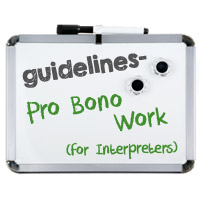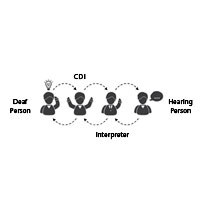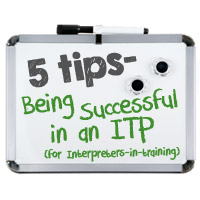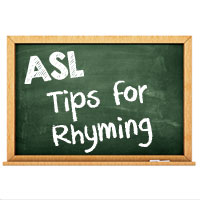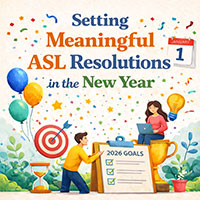All Articles
Interpreting 4-1-1: Guidelines to Help Interpreters When Doing Pro Bono Work
By offering pro bono services, interpreters are enriched professionally and personally. This is something interpreters should all do on a regular basis. Pro bono work is an important part of professional development and it is a great way to help others in need, provide a gift to thank others, and give back to your community.
Interpreter 4-1-1: Certified Deaf Interpreters Explained
While the concept of Certified Deaf Interpreters (CDI) is not new, many people are not familiar with what they do, so misunderstandings can occur on how to utilize deaf interpreters. What is a Certified Deaf Interpreter (CDI)?
Interpreter 4-1-1: 5 Tips for Being Successful in an Interpreter Training Program
This article is specifically for Interpreters in Training. Interpreter Training Programs are both challenging and rewarding. It is really up to the student to make the most of the Interpreter Training Program (ITP). The more passionate and hard working you are, the more rewarding the experience will be.
Think for a moment about your definition of success. What does a successful person do? What does a successful person think? What does a successful person believe? How will you ensure that your time in your Interpreter Training Program is successful? What changes will you need to make?
Here are 5 tips for being successful in an Interpreter Training Program...
Tips for Rhyming in Sign Language
Every year around this time, I get a message or two from teachers and interpreters of deaf children asking how to best convey the concept of rhymes to their students. Rhyming is a very common curriculum goal in many, if not all early childhood education programs throughout the United States and Canada.
The problem often with rhyming is that many of the words are made-up and, therefore, they have no sign. We all know that words that have no sign should ...
New movie to watch for: NO ORDINARY HERO: THE SUPERDEAFY MOVIE
NO ORDINARY HERO: THE SUPERDEAFY MOVIE is a family drama about a deaf actor who plays a superhero on a TV show who must look beyond the cape to inspire a deaf boy to believe in himself.
Based on the internationally known SuperDeafy character, NO ORDINARY HERO, featuring Academy Award winner Marlee Matlin, is the evolution story in this fictitious family drama. John Maucere stars as Tony Kane who plays a superhero on TV, but in real life he’s just another ...
Movies to Check out During Deaf Awareness Week
Not sure what you can do to participate in Deaf Awareness Week? Try to find events in your local area, but if you’re having trouble finding a local Deaf Awareness Week event, a great thing to do is to learn something new about Deaf culture - read some articles, learn a few new signs, or watch a movie about a deaf story.
There are a number of movies that feature deaf stories.
Some of the most well known movies that feature deaf ...
5 Articles for Deaf Awareness Week
Here are some helpful Signing Savvy articles to check out for Deaf Awareness week:
The mysterious confusion between deafness and blindness
Incidental Information You Don't Get when You're Deaf
Education Options for Children that are Deaf or Hard of Hearing
The Use of an Assistance Dog for people who are Deaf and Hard of Hearing
Clearing up the confusion between Translators, Interpreters, and ...
Deaf Awareness Week is September 22-26, 2014
Deaf Awareness Week this year is September 22-26, 2014. Deaf Awareness Week, also called International Week of the Deaf (IWD), is celebrated annually and ends with International Day of the Deaf. Deaf Awareness Week is celebrated by national and regional associations of the deaf, local communities, and individuals worldwide.
The purpose of Deaf Awareness Week is to increase public awareness of deaf issues, people, and culture. Activities and events throughout Deaf Awareness Week encourage individuals to come together as a community ...
Living Loud: K.T. Maviglia - Miss Michigan and Miss America Contestant
K.T. Maviglia was a Miss Michigan and Miss America 2015 Contestant. Read the article to learn more about the life and accomplishments of this amazing hard of hearing woman.
Living Loud: Heather Whitestone - First Deaf Miss America
Heather Whitestone was the First Deaf Miss America. Read the article to learn more about the life and accomplishments of this amazing deaf woman.
ADVERTISEMENTS
